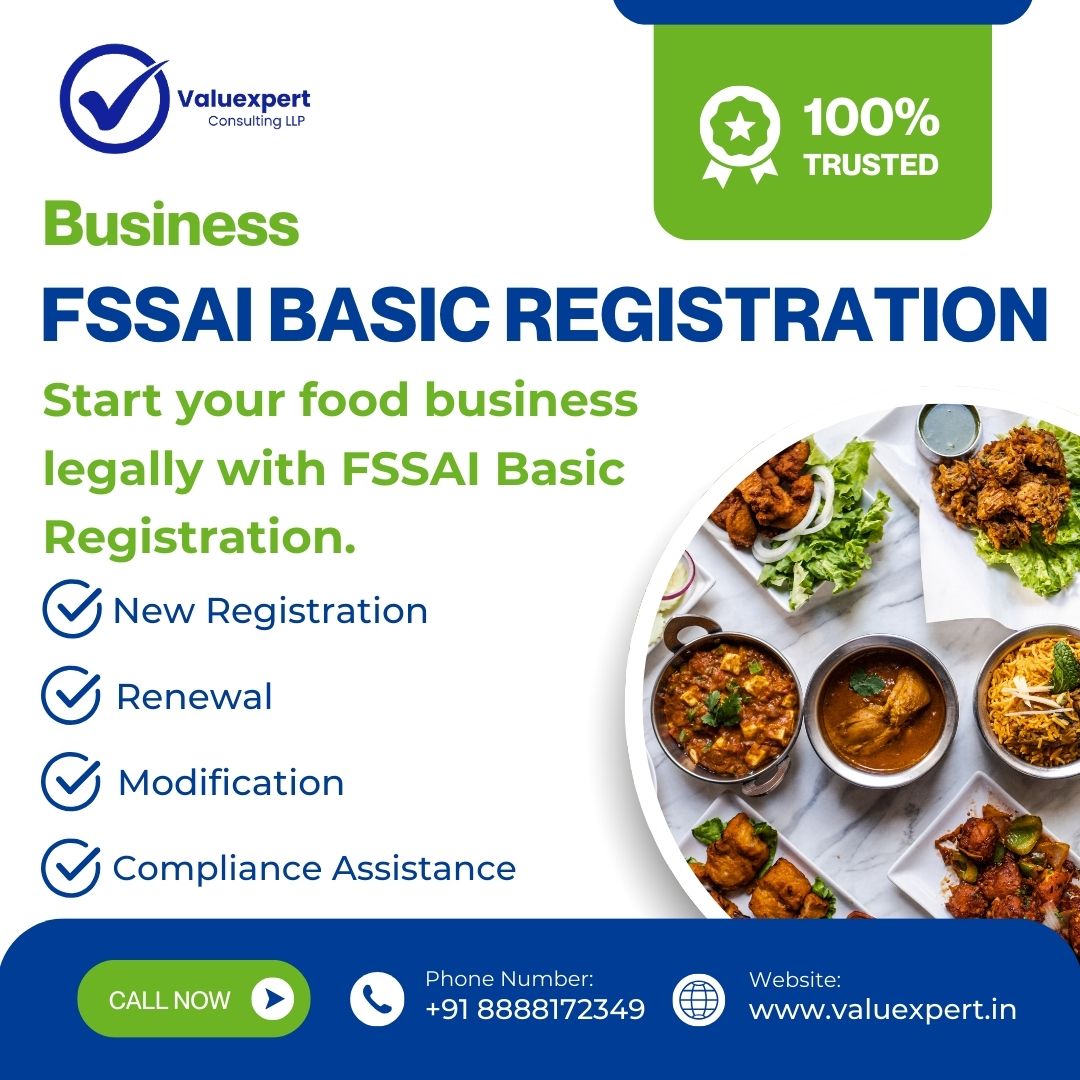FSSAI Registration

"Quality Assurance Starts Here – Start Your FSSAI Journey!"
What is FSSAI ?
FSSAI - Food Safety and Standard Authority of India is an autonomous body that is established under the Ministry of Health and Welfare, Government of India. FSSAI License is responsible for protecting and promoting public health through the regulation.
Every food business operator involved in the manufacturing, processing, storage distribution and sale of food products must compulsorily obtain FSSAI Registration or License.
FSSAI Registration is different from the FSSAI License in the sense that depending on the size and nature of the business, FBO should obtain the necessary registration or license.
It is a 14-digit registration or a license number that is printed on all the food packages. The 14 digit registration number gives details about the assembling state, producer’s permit. This registration procedure is aimed to create more accountability on the FBO to maintain the quality of the food products. The licensing and registration procedure and requirements are regulated by Food Safety & Standards (Licensing and Registration of Food Business) Regulations, 2011.
Business which needs Food License:
FSSAI License/ Registration in India is mandatory for all food and food-related businesses, this 14 digit License number gives us information about the permit of the producer.
The following businesses mandatory need to obtain the FSSAI Registration or License.
1) Petty retailers, retail shops, snacks shops, confectionery or the Bakery Shop, etc.
2) Temporary stalls, or food premises that are involved in the preparation, distribution, storage, and sale of food products.
3) Hawkers who sell packed or freshly prepared food.
4) Dairy units like milk chilling units, petty milkman, and the milk vendors.
5) Vegetable oil processing units.
6) Slaughterhouse like meat shop, mutton shop, chicken shop, lamb meat shop.
7) Meat and Fish processing units.
8) All food manufacturing and processing units include the repacking of food.
9) Proprietary and novel food.
10) Cold store facility.
11) Transporter of food products that have several specialized vehicles like the insulated refrigerated van/wagon, milk tanker, food wagon, food trucks.
12) Any wholesaler, supplier, distributor, and marketer of food products.
13) Hotels, Restaurants, and Bars.
14) Dhaba, Banquet halls with food catering, home-based food services and
15) food stalls in fairs or other religious places.
16) Importers and the Exporters of Food.
17) And cloud kitchens.
Types of FSSAI License:
Businesses engaged in food activities are required to apply for a food license which can be of different types based on turnover, the scale of business, and the type of activity. The Types of FSSAI Food licenses are as follows:
1) FSSAI Basic Registration :
The FSSAI registration is for food business operators (FBOs) who have small-sized businesses or start-ups. They have an annual turnover of less than Rs.12 lakh. Basic registration can be upgraded depends on your business sales graph productivity.
a) The basic registration is for the FBOs which have their turnover up to Rs.12 lakh
b) The basic registration is for the petty food business
c) In this registration, the document required Form A to be filled.
2) FSSAI State license:
The State FSSAI License is for the FBOs which have medium-size business. They have an annual turnover of more than Rs.12 Lakhs or up to Rs. 20 crores. The state license can be further upgraded to a central license, all depends on your business sale graph productivity.
a)The state license is for those FBOs which have their turnover up to Rs 12 lakh to Rs.20 crore
b) The state license is for the medium-sized food business.
c) In this registration, the document required Form B to be filled.
3) FSSAI Central license:
The Central FSSAI License is applicable for FBOs which have a large business annual turnover i.e. above Rs.20 crores. It is also required in cases where you need to supply at the government offices or import/export food products.
a) The central license is for those FBOs which have their turnover more than Rs.20 crore.
b) The central license is for the large food business.
c) In this registration, the document required Form B to be filled.
Benefits of FSSAI License:
a) Consumer Awareness:
All FBOs must know that a FSSAI Licence adds the benefit of a reliable & loyal customer base.
b) Legal Advantage:
FSSAI Registration is done under the regulatory body FSSAI, and legal action can be taken for any non- compliance.
c) FSSAI Logo:
FSSAI logo is a mark of validity and an assurance to your consumers that the food is safe to consume.
d) Business Expansion:
The goodwill of the Food Safety Management Systems (FSMS) will make a business available and effortless to expand.
Procedure for Online FSSAI Registration:
a) Complete a Simple Form:
You need to fill our FSSAI application form and provide details about your food business.
b) Send your Documents:
You need to email us the required documents and we will create your FSSAI Form A and Form B
c) Documents Submission:
Your FSSAI License applications along with other declarations are filed to the local FBO by our CS/ CA.
d) Food License Issued:
We will mail you the license which will act as a food license, after regular follows ups with the food safety department
Documents required for Food License:
a) Declaration form
b) Authority letter
c) Copy of Property paper (If owned property)
d) Copy of Rent Agreement (If rented Property)
e) Food Safety Management System plan or certificate
f) Electricity/ Water bill (Business Place)
g) Copy of Aadhaar Card/ Voter identity card of Proprietor/ Partners/ Director
h) Form IX: Nomination of Persons by a Company along with the Board Resolution
Validity Time of FSSAI License:
FSSAI license validity stretches out from 1 to 5 years. According to the FSSAI rules, the food business operator is required to appeal for the renewal of the license in 30 days and it should be made before it’s expiry. Any FSSAI renewal application filed exceeding the expiry date is required to pay a late fee of Rs.100 per day for each day of delay. So, it’s essential for all food business operators to track and assure that their FSSAI license is valid at every time.
FSSAI License Renewal:
The food license allotted has a validity of one year and can be increased to a maximum of 5 years by the food regulatory body. The moment license validity gets expired and the food business operator becomes liable for a FSSAI License renewal. The FSSAI renewal system is manageable and should be taken into the account as soon as possible to avoid penalties. FSSAI has released guidelines which states that in 30 days and before the expiry of the license, the food safety registration has to get renewed.
Penalty of Non-Compliance:
Below is a list of FSSAI penalties for an FBO found which is found to be non-compliant to the provisions:
If the food business is running without taking an FSSAI certificate, the act is punishable under law. The FBO may face imprisonment and a fine of up to Rs.5 lakh for this.
If the FBO is selling the sub-standard quality of food items, it may be charged for an amount up to Rs.5 lakhs. In such a case, the person selling the sub-standard items, either himself or by a person working on his behalf, will be held responsible.
The business selling misbranded goods, either himself or by a person working on his behalf, can be penalized up to Rs.3 lakh.
All the FBOs included in sales, packers, storage, distributions, or importing of Food Items comprising superfluous or extraneous matter, a penalty may get levied of Rs.1 lakh.
The penalty specified in the above points may vary, according to the conditions. In extreme cases, where death occurs due to consumption of the particular food item, the fine may extend to Rs.5 lakh along with imprisonment, depending upon the harm caused.
